
The politics of Russia take place in the framework of the federal semi-presidential republic of Russia. According to the Constitution of Russia, the President of Russia is head of state, and of a multi-party system with executive power exercised by the government, headed by the Prime Minister, who is appointed by the President with the parliament's approval. Legislative power is vested in the two houses of the Federal Assembly of the Russian Federation, while the President and the government issue numerous legally binding by-laws. Since the collapse of the Soviet Union at the end of 1991, Russia has seen serious challenges in its efforts to forge a political system to follow nearly seventy-five years of Soviet governance. For instance, leading figures in the legislative and executive branches have put forth opposing views of Russia's political direction and the governmental instruments that should be used to follow it. That conflict reached a climax in September and October 1993, when President Boris Yeltsin used military force to dissolve the parliament and called for new legislative elections. This event marked the end of Russia's first constitutional period, which was defined by the much-amended constitution adopted by the Supreme Soviet of the Russian Soviet Federative Socialist Republic in 1978. A new constitution, creating a strong presidency, was approved by referendum in December 1993.
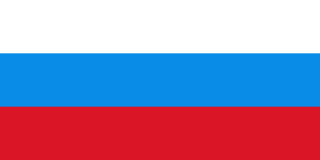
The modern history of Russia began with the Russian Republic of the Soviet Union gaining more political and economical autonomy amidst the imminent dissolution of the USSR during 1988–1991, proclaiming its sovereignty inside the Union in June 1990, and electing its first President Boris Yeltsin a year later. The Russian SFSR was the largest republic of the Soviet Union, but it had no significant independence before, being the only Soviet republic to not have its own branch of the Communist Party.

The chairman of the government of the Russian Federation, also informally known as the prime minister, is the head of government of Russia and the second highest ranking political office in Russia. Although the post dates back to 1905, its current form was established on 12 December 1993 following the introduction of a new constitution.
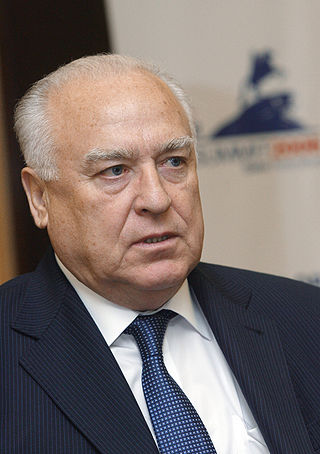
Viktor Stepanovich Chernomyrdin was a Soviet and Russian politician and businessman. He was the Minister of Gas Industry of the Soviet Union, after which he became first chairman of Gazprom energy company and the second-longest-serving Prime Minister of Russia (1992–1998) based on consecutive years. He was a key figure in Russian politics in the 1990s and a participant in the transition from a planned to a market economy. From 2001 to 2009, he was Russia's ambassador to Ukraine. After that, he was designated as a presidential adviser.

Sergei Vadimovich Stepashin is a Russian politician who briefly served as Prime Minister of Russia in 1999. Prior to this he had been appointed as federal security minister for counterintelligence by President Boris Yeltsin in 1994, a position from which he resigned in 1995 as a consequence of the Budyonnovsk hospital hostage crisis. Subsequent to his tenure as Prime Minister he served as Chairman of the Accounts Chamber of Russia from 2000 until 2013.

Yevgeny Maksimovich Primakov was a Russian politician and diplomat who served as Prime Minister of Russia from 1998 to 1999. During his long career, he also served as Foreign Minister, Speaker of the Supreme Soviet of the Soviet Union, and chief of the intelligence service. Primakov was an academician (Arabist) and a member of the Presidium of the Russian Academy of Sciences.

Presidential elections were held in Russia on 26 March 2000. Incumbent prime minister and acting president Vladimir Putin, who had succeeded Boris Yeltsin after his resignation on 31 December 1999, sought a four-year term in his own right and won in the first round.

Our Home – Russia was a Russian political party that existed from 1995 to the mid-2000s.

Galina Vasilyevna Starovoitova was a Soviet dissident, Russian politician and ethnographer known for her work to protect ethnic minorities and promote democratic reforms in Russia. She was shot to death in her apartment building in 1998.
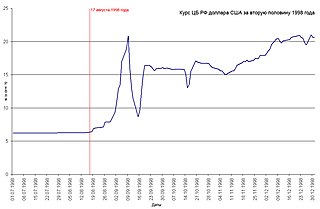
The Russian financial crisis began in Russia on 17 August 1998. It resulted in the Russian government and the Russian Central Bank devaluing the ruble and defaulting on its debt. The crisis had severe impacts on the economies of many neighboring countries.

Sergei Kiriyenko's Cabinet was the sixth cabinet of government of the Russian Federation, preceded by Viktor Chernomyrdin's Second Cabinet and followed by Yevgeny Primakov's Cabinet. It was led by Prime Minister Sergey Kiriyenko, appointed acting Prime Minister on March 23 and proposed to the State Duma for approvement on March 27, 1998. On April 10 and April 17 Duma disapproved him as Prime Minister twice, but on the third time on April 24 he was approved by the State Duma and appointed Prime Minister by the President. According to the Constitution of Russia, if the State Duma rejects the President's nomination three times, it must be dissolved and a parliamentary election held.
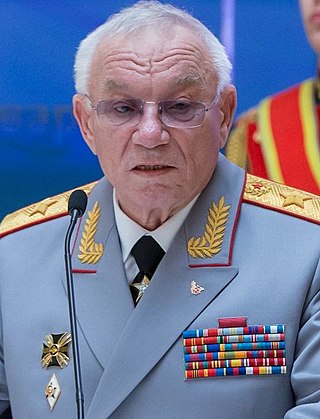
Anatoly Sergeyevich Kulikov is a Russian General of the Army, former Interior Minister of Russia (1995–1998).

Vadim Gustov is a Russian politician who served as first deputy prime minister of Russia from 1998 to 1999 and a regional leader.

Vladimir Bulgak is a Russian engineer, bureaucrat and politician. He served in different capacities in various cabinets of Russia, including deputy prime minister.
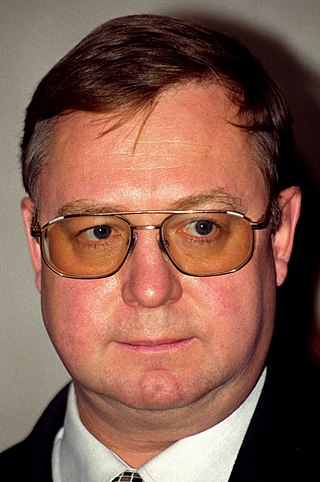
Sergei Stepashin's Cabinet was the Cabinet of Russian Prime Minister Sergei Stepashin from May to August 1999. The Cabinet served under the presidency of Boris Yeltsin.
Events from the year 1998 in Russia.

The presidency of Boris Yeltsin began with his first inauguration on 10 July 1991, and ended on 31 December 1999 when he announced his resignation. A referendum held on 17 March 1991 approved the creation of the post of president of Russia; Yeltsin was elected Russia's first president in a presidential election held on 12 June 1991.

The State Duma of the Federal Assembly of the Russian Federation of the 2nd convocation is a former convocation of the State Duma, Lower House of the Russian Parliament. The 2nd convocation meets at the State Duma building in Moscow, worked from December 17, 1995 – December 19, 1999.
Several years have been referred to as the Year of three prime ministers or Year of the three prime ministers. This list does not represent all times that a country has had three prime ministers in a single year.
In the early 2000s, significant political changes took place in Russia with Vladimir Putin's rise to power. Putin, who previously held key positions in the security forces and government, became the successor to President Boris Yeltsin.


















